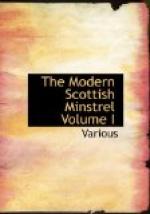Let all the joyous banquet
share,
Nor e’er let Gothic
grandeur dare,
With scowling brow, to overbear,
A vassal’s
right invading.
Let Freedom’s conscious
sons disdain
To crowd his fawning, timid
train,
Nor even own his haughty reign,
Their dignity
degrading.
Ye northern chiefs, whose
rage unbroke
Has still repell’d the
tyrant’s shock;
Who ne’er have bow’d
beneath his yoke,
With servile base
prostration;—
Let each now train his trusty
band,
’Gainst foreign foes
alone to stand,
With undivided heart and hand,
For Freedom, King,
and Nation.
MRS JOHN HUNTER.
Anne Home was born in the year 1742. She was the eldest daughter of Robert Home, of Greenlaw, in Berwickshire, surgeon of Burgoyne’s Regiment of Light Horse, and afterwards physician in Savoy. By contracting an early marriage, in which affection overcame more prudential considerations, both her parents gave offence to their relations, who refused to render them pecuniary assistance. Her father, though connected with many families of rank, and himself the son of a landowner, was consequently obliged to depend, in the early part of his career, on his professional exertions for the support of his family. His circumstances appear subsequently to have been more favourable. In July 1771, Miss Home became the wife of John Hunter, the distinguished anatomist, to whom she bore two children. She afforded evidence of her early poetical talent, by composing, before she had completed her twenty-third year, the song beginning, “Adieu! ye streams that smoothly glide.” This appeared in the Lark, an Edinburgh periodical, in the year 1765. In 1802, she published a collection of her poems, in an octavo volume, which she inscribed to her son, John Banks Hunter.
During the lifetime of her distinguished husband, Mrs Hunter was in the habit of receiving at her table, and sharing in the conversation of, the chief literary persons of her time. Her evening conversazioni were frequented by many of the more learned, as well as fashionable persons in the metropolis. On the death of her husband, which took place in 1793, she sought greater privacy, though she still continued to reside in London. By those who were admitted to her intimacy, she was not more respected for her superior talents and intelligence, than held in esteem for her unaffected simplicity of manners. She was the life of her social parties, sustaining the happiness of the hour by her elegant conversation, and encouraging the diffident by her approbation. Amiable in disposition, she was possessed of a beautiful countenance and a handsome person. She wrote verses with facility, but she sought no distinction as a poet, preferring to be regarded as a good housewife and an agreeable member of society. In her latter years, she obtained amusement in resuming the song-writing habits of her youth, and in corresponding with her more intimate friends. She likewise derived pleasure in the cultivation of music: she played with skill, and sung with singular grace.




